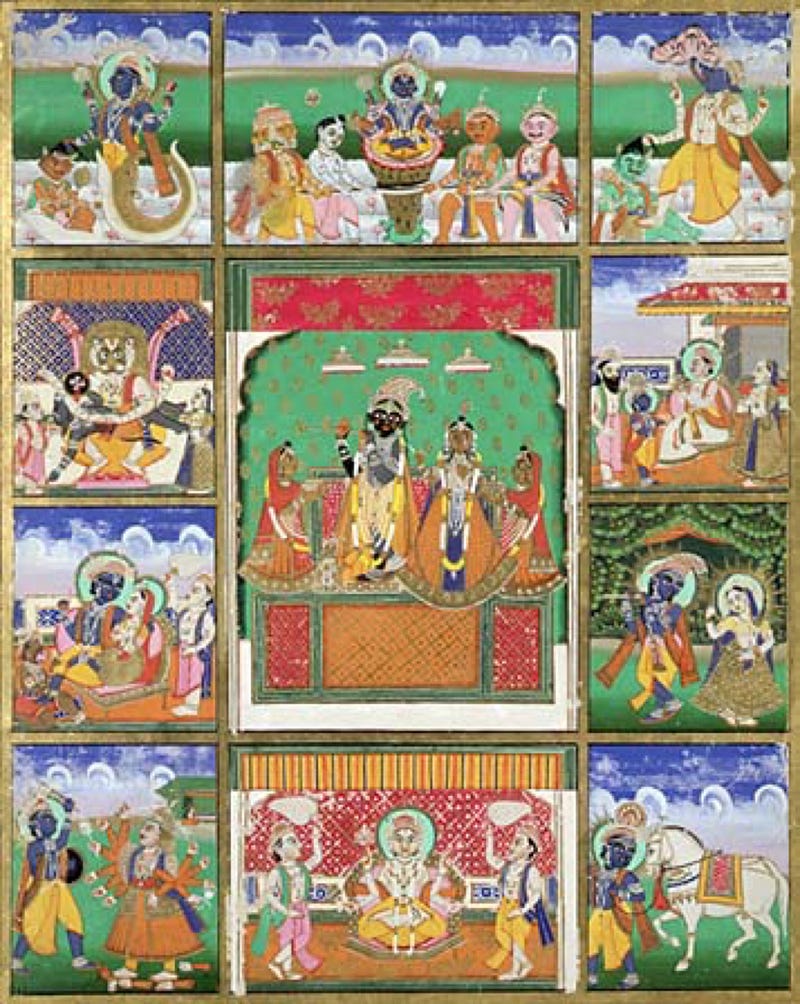This cycle includes animals. Apparently the most effective way to achieve one's dharma is usually through a human birth. But if humans commit too many sins, their karma/dharma cycle will be set back and they will be born as animals. An animal rebirth has many different and conflicting viewpoints.
On one hand, animals are revered. Many gods have animal steeds on which they ride into battle on. For example, Shiva has his bull named Nandhi. Since many people idolize and pray to every part of Lord Shiva, they also pray to his steed Nandhi. As such, the bull and the cow are considered holy in Hinduism. This is paralleled in Lord Vishnu, who has Garuda the eagle as his steed. So on and so forth. Also, some of Lord Vishnu's reincarnation/rebirths onto the mortal realm of Earth were in animal forms. Lord Vishnu's reincarnations are most famously known as his Dasavatara; "das" meaning ten, "avatara" meaning avatars or reincarnations.
 |
| Figure 1: Lord Vishnu's Dasavatara. The Matsya, Kurma, Varaha, and Narasimha avatars contained animal features |
Of his ten reincarnations, four were of animal forms. They played immensely important roles in the creation of the world. I encourage everyone to read up on the link I posted ^ because it explains how incredibly important they are.
There is one such example in the Mahabharatha. "one day King Pandu was out hunting. A sage and his wife were also sporting in the forest in the guise of deer. Pandu shot the male deer with an arrow, all ignorant of the fact that it was a sage in disguise. Stricken to death the rishi thus cursed Pandu: 'sinner, you will meet with death the moment you taste the pleasures of the bed, as you have robbed me of mine'" (38).
This story portrays the consequences of killing an animal. Another piece of Hindu lore, apparently a lot of celestial beings like gods and sages often travel about the mortal world in the guise of animals in order to escape notice. If one kills an animal, and if it was a celestial being in disguise, that would mean that they have killed a celestial being! Since the chance of this is high, parents usually teach their kids to approach strangers and animals with care, because you never know when a god is visiting you.
With the murder of the sage in deer form, King Pandu accrued a sin. He was also cursed. He also robbed the sage of his own pleasures, and of his chance to complete his dharma in the world. Because of the aforementioned views, many Hindus take to vegetarianism as a way to protect the sanctity of life. Vegetarianism is also a way to ensure that those people do not inadvertently commit a sin by extinguishing another's life before they are able to fulfill their dharma. For example, say that you were born as a human and you failed to complete your dharma and you die without fulfilling it. You are somehow reborn as a chicken. If another human ate you, they have committed a lot of sins. These sins include not only ending a life, but also ending a life before they can fulfill their karma/dharma cycle.
In my own life, my family raised me with a vegetarian lifestyle. I chose to continue this lifestyle as I moved on to college to living on my own in a different state. Recent press, media, and trends have given rise to the trope of the "vegan" who always rants about killing and abusing animals. While my own ethics requires me to not kill and eat any animal, I would never presume to ask others to follow in my footsteps. I would never presume to know someone else's dharma or karma; therefore, I would never turn into that "trope" of the "crazy vegan". Many people are always turned off, surprised, uncomfortable, or disgusted when I mention that I am vegetarian. This aversion is part of the reason why I wanted to write this blog post explaining the basis of my decision to remain vegetarian.
No comments:
Post a Comment